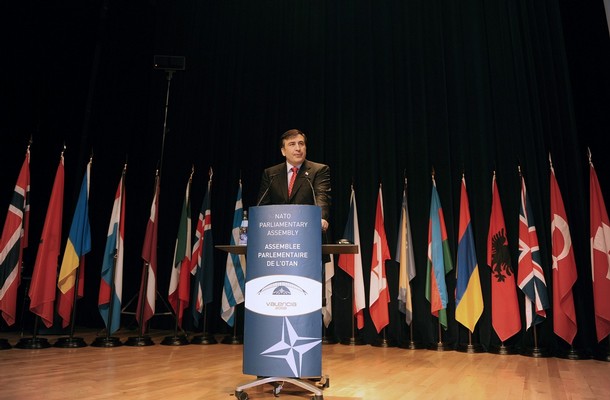NATO foreign ministers will meet in Brussels today to, in the words of the April 3 NATO Bucharest Summit Statement, “make a first assessment” on Georgia’s quest for membership in the alliance. In the aftermath of Russia’s August attack on Georgia, a Membership Action Plan (MAP) is not now politically possible.
However, a majority of alliance members will insist upon recommitting to the April Summit statement that Georgia will become a member of NATO. Moreover, the foreign ministers will no doubt find some formula under which NATO and Georgia can continue to work together on reform and interoperability that would lead to membership. “There are various pathways to membership,” US Secretary of Defense Robert Gates told a press conference on the margins of a November 13 NATO gathering in Tallinn.
Georgia must now take what is politically possible and forge ahead. The choice of Euro-Atlantic integration, particularly NATO membership, is still right for Georgia. Conversely, Georgia in NATO remains the right choice for the alliance.
Furthermore, the foreign ministers meeting today in Brussels must recognize that Russia’s August attack on Georgia was an assault on direct NATO interests, particularly viability of the East-West Corridor and stability on the Black Sea.
The oil and gas pipelines that connect the landlocked Caspian Sea to markets in Western Europe had a lot to do with the war. Georgia — fulcrum of the pipelines, gateway to the Caspian, and democratic anchor on the Black Sea’s eastern shore — is a key to the kind of regional stability needed to underpin a broad East-West Corridor that hastens commerce in much more than just oil and gas. The Baku-Tbilisi-Ceyhan (BTC) Pipeline’s scale—1.776 kilometres and a million barrels per day capacity—sets it in a class by itself. But its real significance is geopolitical. BTC bypasses sensitive areas, affording western access to Caspian Sea and Central Asian energy and offering a choice of customers to the landlocked producing states. At the Turkish Mediterranean port of Ceyhan, the Caspian crude pours into tankers bound for world oil markets. Parallel to BTC, natural gas flows from the Caspian Sea’s Shah Deniz field through the South Caucasus Pipeline to the Turkish city of Erzurum. There it merges with the Turkish gas distribution system, bound for consumers throughout Europe.
Together, these energy conduits form the critical mass required to promote and sustain a broad East-West commercial corridor. In this regard, the Kars-Tbilisi-Baku Railroad will be a multi-purpose carrier, bringing commercial development along its route and beyond. Whether by pipeline, rail, road or water — through the Turkish Straits to Marseilles or via the Danube and Rhine Rivers to Rotterdam — we now have the prospect of firmly linking the Caspian Sea and the Eurasian heartland to a North Atlantic trading system that extends from Batumi and Ceyhan in the east to Houston in the west.
And with commerce come people, so the East-West corridor will also become a pathway for ideas, perhaps the most important prospect of all.
Sadly, it was the prospect of opening up the Eurasian heartland that truly provoked Russia’s attack on Georgia.
Nonetheless, we must not now shrink from the historic opportunity that lies before us. We must build a solid foundation of security and stability from the Black Sea to the Caspian—Georgia is the key.
Looking east, Georgia’s geographical position would afford NATO reach toward the Caspian Sea and Central Asia beyond, outflanking potential trouble spots. This kind of reach is crucial not only for military operations, but also for counter-terrorism and combating trafficking in drugs, people and arms of who knows what sort.
Looking west, Black Sea security is now firmly on the NATO agenda. This reflects the alliance’s post Cold War reorientation toward south and east, so-called “out-of-area” operations such as Kosovo and Afghanistan, and alliance enlargement.
Bulgaria and Romania joined NATO in 2004. They should now become NATO windows on a stable lake, not its fortresses on a sea of instability. Turkey, on the Black Sea’s southern shore, should be part of the Euro-Atlantic mainstream, not its last outpost in a troubled world.
Georgia offers a unique geostrategic position on the eastern shore of the Black Sea. Sensors emplaced in Georgia, use of its air and seaports, and rebuilding its small but capable Coast Guard would be strong complements to NATO air and sea surveillance.
The benefits to the alliance would be a clear picture of Black Sea air and maritime traffic, timely information, forward protection for Bulgaria, Romania and Turkey, and enhanced capability to react when necessary.
Georgia in NATO just makes sense, not just for Georgia, but also for all 26 current alliance members. Frankly, it would enhance Russian security and prosperity as well, but Prime Minister Vladimir Putin’s Russia is too myopic to see it. Someday — maybe sooner than Putin thinks — progressive Russians will see it. Maybe Russia will want to join too!
Meanwhile, NATO must politely but firmly tell Moscow that Georgia will be a member of NATO — and soon.
David J. Smith is Director, Georgian Security Analysis Center, Tbilisi, and Senior Fellow, Potomac Institute for Policy Studies, Washington. This column originally appeared in 24 Saati (24 Hours), Tiblisi’s major newspaper.
Image: saakashvili-nato-bucharest-photo.jpg
